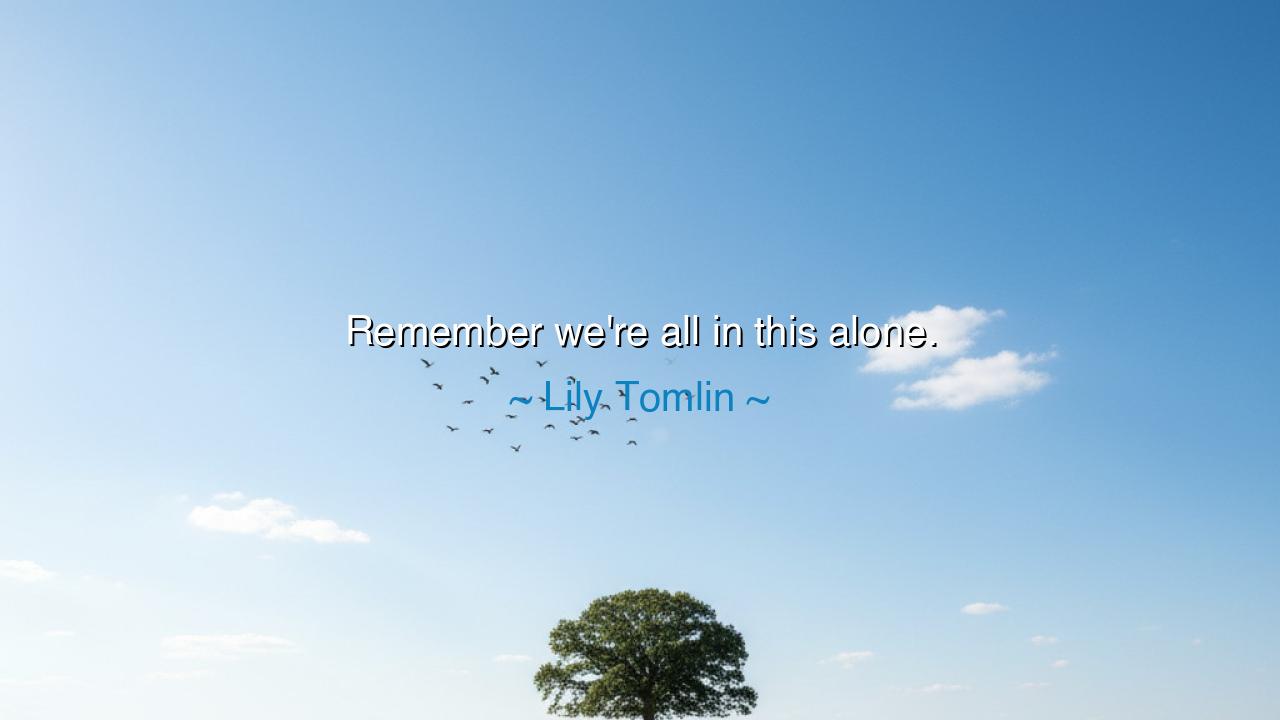
Remember we're all in this alone.






"Remember we're all in this alone." These words by Lily Tomlin carry a profound and often uncomfortable truth about the nature of human existence. Though we are constantly surrounded by people, loved ones, friends, and companions, we must ultimately face the trials and challenges of life alone. The human condition is one of both connection and solitude—a paradox where we seek unity but must also come to terms with the fundamental independence of our journey. Tomlin’s statement reminds us that no matter how much we are supported by others, we are each born and die alone, and it is within that solitude that our true strength and understanding emerge.
In the ancient world, philosophers like Socrates and Epicurus recognized the dual nature of life—our need for connection and our inevitable aloneness. Socrates, though surrounded by followers and disciples, often retreated into moments of solitude to reflect on the nature of existence. His famous saying, "Know thyself," implies that in order to understand the world, we must first understand our own minds and hearts. This understanding could only be achieved through personal reflection, not through the words of others or external influences. Solitude was seen not as something to be feared, but as a means of deepening one's connection with oneself and the universe.
Similarly, Epicurus, the ancient Greek philosopher, advocated for the pursuit of happiness through self-sufficiency and the cultivation of inner peace. While he valued friendship, he believed that true contentment came from within—through moderation, reflection, and the acceptance of one’s own mind as the ultimate source of harmony. The idea that we must learn to be at peace with ourselves, irrespective of external circumstances, echoes Tomlin's words. In solitude, we find the opportunity to build a life of meaning, free from the distractions and expectations of others.
The greatness of heroes throughout history often lay in their ability to confront solitude with courage. Take, for example, Marcus Aurelius, the Roman Emperor and Stoic philosopher. Despite ruling over the vast Roman Empire, Marcus often faced the trials of loneliness and self-doubt. His Meditations, written in the quiet of his own reflections, reveal a man grappling with the weight of leadership and his internal struggles. Yet, in his solitude, Marcus found the strength to lead with wisdom, reminding us that greatness is born not from external validation, but from inner fortitude. He understood that, much like Tomlin suggests, we must face life alone, and it is in those moments that we truly grow.
Tomlin’s words also underscore the impermanence of life and the fleeting nature of human connection. Friendships, family, and companionships—though cherished—are ultimately temporary in the grand scheme of things. We may feel supported and loved, but we must eventually navigate the depths of existence on our own. This was a truth felt deeply by Hemingway, who in his later years, despite his fame and relationships, confronted solitude and despair. His struggle was not with the absence of people, but with the existential realization that no matter how much we are loved, we ultimately face life’s greatest questions alone.
The lesson in Tomlin’s words is that solitude is not to be feared or avoided, but embraced. It is in aloneness that we are most likely to encounter our true selves. Far from being a curse, solitude offers the space for self-discovery, creativity, and growth. The noise of the world, the distractions of daily life, and the expectations of others can often prevent us from fully understanding who we are. When we are alone, free from external pressures, we can connect with the deepest parts of our being and pursue a path that is true to ourselves.
In practical terms, this means we must cultivate moments of solitude in our lives. Whether through meditation, journaling, or simply taking time away from the hustle and bustle, we must learn to value these moments. By giving ourselves the opportunity to sit with our thoughts, we can face the uncertainty of life with greater clarity and strength. Solitude is not about isolation, but about embracing our humanity, understanding that we are, in the end, the only ones who can navigate our journey with integrity and purpose.
In conclusion, Lily Tomlin’s quote reminds us that solitude is an inevitable part of the human journey—an aspect of life that cannot be escaped. While we seek connection and companionship, we must also come to terms with the reality that we must ultimately confront life’s challenges and mysteries alone. Yet, in this aloneness lies an opportunity for profound growth, self-understanding, and peace. Just as the ancient philosophers and great historical figures learned, we too must embrace solitude, for it is in solitude that we find the strength to live fully, authentically, and with purpose.






AAdministratorAdministrator
Welcome, honored guests. Please leave a comment, we will respond soon